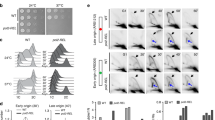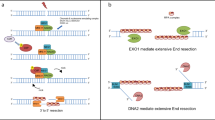Abstract
DNA polymerase κ (pol κ) is a member of the Y-family of DNA polymerases that are thought to function in translesion synthesis (TLS) past different types of DNA damage. Here, we show that pol κ-deficient mouse cells have substantially reduced (but not absent) levels of nucleotide excision repair (NER) of UV damage, as measured by several methods. Our results provide evidence for an unexpected role for pol κ in mammalian NER.
This is a preview of subscription content, access via your institution
Access options
Subscribe to this journal
Receive 12 print issues and online access
$209.00 per year
only $17.42 per issue
Buy this article
- Purchase on SpringerLink
- Instant access to full article PDF
Prices may be subject to local taxes which are calculated during checkout


Similar content being viewed by others
References
Avkin, S. et al. J. Biol. Chem. 279, 53298–58305 (2004).
Ogi, T., Shinkai, Y., Tanaka, K. & Ohmori, H. Proc. Natl Acad. Sci. USA 99, 15548–15553. (2002).
Ogi, T., Kannouche, P. & Lehmann, A. R. J. Cell Sci. 118, 129–136 (2005).
Bi, X., Slater, D. M., Ohmori, H. & Vaziri, C. J. Biol. Chem. 280, 22343–22355 (2005).
Okada, T. et al. J. Biol. Chem. 277, 48690–48695 (2002).
Ohashi, E. et al. Genes Dev. 14, 1589–1594 (2000).
Shivji, M., Podust, V. N., Hubscher, U. & Wood, R. D. Biochemistry 34, 5011–5017 (1995).
Syvaoja, J. et al. Proc. Natl Acad. Sci. USA 87, 6664–6668 (1990).
Dresler, S. L. J. Biol. Chem. 259, 13947–13952 (1984).
Einolf, H. J. & Guengerich, F. P. J. Biol. Chem. 275, 16316–16322 (2000).
Suzuki, N. et al. Biochemistry 40, 15176–15183 (2001).
Haracska, L., Prakash, L. & Prakash, S. Proc. Natl Acad. Sci. USA 99, 16000–16005 (2002).
Godoy, V. G., Jarosz, D. F., Walker, F. L., Simmons, L. A. & Walker, G. C. EMBO J. 25, 868–879 (2006).
Kawamoto, T. et al. Mol. Cell 20, 793–799 (2005).
McIlwraith, M. J. et al. Mol. Cell 20, 783–792 (2005).
Acknowledgements
We are grateful to H. Ohmori for helpful comments and for the Polk-deficient MEFs, and to H. Fawcett and L. Ju for technical assistance. This work was supported by a Medical Research Council (MRC) programme grant to A.R.L. and an Uehara Memorial Foundation grant to T.O.
Author information
Authors and Affiliations
Corresponding author
Ethics declarations
Competing interests
The authors declare no competing financial interests.
Supplementary information
Supplementary Information
Supplenentary Figure S1 and Supplementary Methods (PDF 106 kb)
Rights and permissions
About this article
Cite this article
Ogi, T., Lehmann, A. The Y-family DNA polymerase κ (pol κ) functions in mammalian nucleotide-excision repair. Nat Cell Biol 8, 640–642 (2006). https://doi.org/10.1038/ncb1417
Received:
Accepted:
Published:
Issue Date:
DOI: https://doi.org/10.1038/ncb1417



